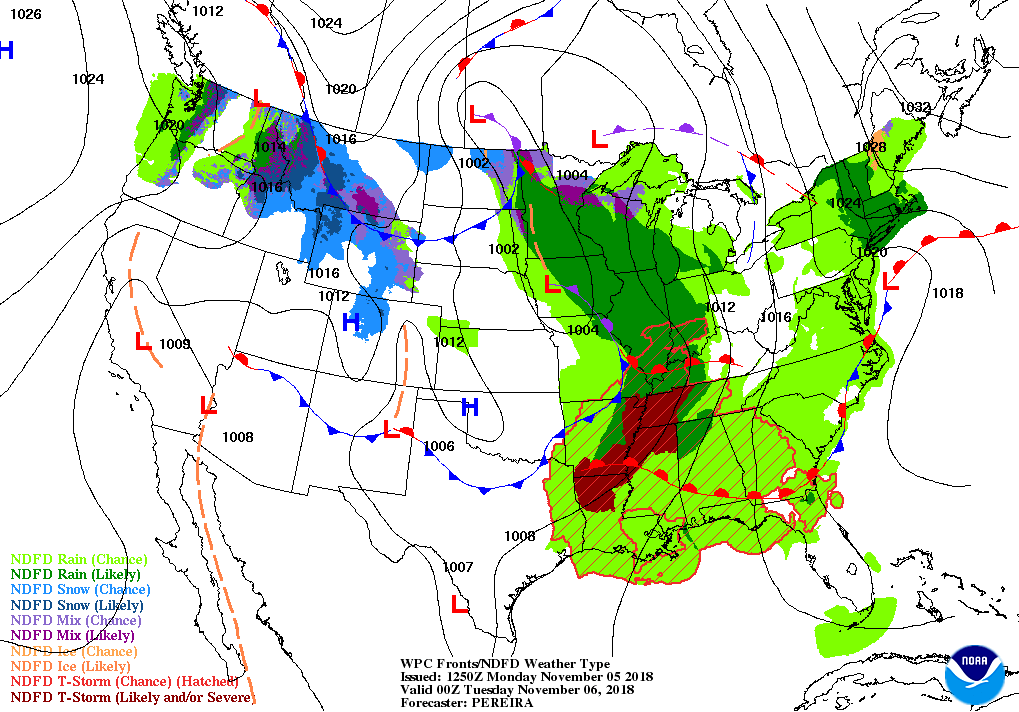- Stormy weather and snowfall are expected to hit on Election Day that could depress turnout, which studies say could favor GOP candidates.
- However, there’s a chance rain could actually hurt Republicans in some states.
- A study found “weather may have contributed to two Electoral College outcomes, the 1960 and 2000 presidential elections.” John F. Kennedy, a Democrat, won the 1960 election, while Republican George W. Bush won in 2000.
Severe storms are brewing ahead of Election Day that could bring heavy rainfall across the eastern U.S., and possibly even “very large” tornadoes in the southeast, according to forecasters.
What’s got people talking is the prospect of stormy weather hitting states with tight gubernatorial and congressional races, including Indiana, Wisconsin and Iowa.
The National Weather Service (NWS) warned a “significant severe weather outbreak is forecast to intensify Monday night with potential for very large tornadoes EF-2 or greater possible” in the lower Ohio and Tennessee valleys.
A significant severe weather outbreak is forecast to intensify Monday night with potential for very large tornadoes EF-2 or greater possible. Remember to have more than one way to get warnings, and have a plan for how to manage taking action during nocturnal storms. https://t.co/8xZtEGNCLY
— NWS (@NWS) November 4, 2018
Storms in the East and heavy snowfall in the Rockies is expected to start on Monday and intensify overnight, NWS said. The storm front will move east from the Midwest on Tuesday, NWS said, bringing rainfall and flood risks to parts of the eastern U.S.
“This front will continue to move east, with showers and storms moving from the Midwest into the eastern U.S. on Tuesday,” according to a NWS forecast issued Monday morning.
“[T]here is the potential for some storms to become strong to severe, with the Storm Prediction Center indicating a Slight Risk for severe weather for a portion of the Southeast northward into the Mid-Atlantic region” on Tuesday, NWS warned.
“Storms are expected to diminish across much of the East as the front moves offshore Tuesday evening,” according to NWS.
Forecasters began warning of severe weather on Election Day as early as November 2. Meteorologist Ryan Maue said models showed “[w]intry mix in the Midwest” and “[s]evere weather in the south.” (RELATED: Trump’s EPA Pushes Back On The ‘Numerous Errors’ In CNN Report)
“Heavy rain, gusty winds will lead to difficult travel conditions,” Maue tweeted on Friday. “Serious weather problems here.”
Model guidance still looks ominous for #ElectionDay severe weather across the Southeast US including #Atlanta Georgia.
Intense area of low-pressure for early November — not quite a winter storm but possibly mixed slop in Wisconsin.
(ECMWF simulated satellite) pic.twitter.com/MZ0qUrl8wD— Ryan Maue | weathermodels.com (@RyanMaue) November 2, 2018
Late tonight into Tuesday morning, line of thunderstorms sweeps east through the Ohio Valley into the Southeast. The strongest and most likely severe storms will be along the southern end of the front. pic.twitter.com/Iu30l7O0jQ
— Ryan Maue | weathermodels.com (@RyanMaue) November 5, 2018
The big question is whether or not stormy weather could impact tight races in places where severe rain is expected, including Tennessee and Indiana.
Indiana Democratic Sen. Joe Donnelly, for example, is in a tight race against businessman Mike Braun, a Republican. Donnelly has a narrow 0.8 percent lead on Braun, according to the RealClearPolitics polling average.
Likewise, RealClearPolitics sees gubernatorial races in Iowa and Wisconsin as “toss-ups” with Republican and Democratic candidates nearly tied in the polling average. Rainfall is likely across both states on election day, according to NWS.

Source: National Weather Service
Experts say severe weather, from rain storms to blizzards, can have an impact on voter turnout, potentially swinging close elections in some states. Some research shows that rainfall on Election Day benefits Republicans.
“There are people who, no matter what happens, they are going to vote. Those folks tend to be older, those folks tend to be more well educated and those folks tend to be whiter. Those folks also tend to be more Republican now,” Mike Binder, director of the Public Opinion Research Lab at the University of North Florida told Accuweather.
A 2007 study found that rain reduced voter participation in presidential elections a little less than one percent, and an inch of snow reduced turnout about one-half percent. The study found: “Poor weather is also shown to benefit the Republican party’s vote share.”
The 2007 study also said “weather may have contributed to two Electoral College outcomes, the 1960 and 2000 presidential elections.” John F. Kennedy, a Democrat, won the 1960 election, while Republican George W. Bush won in 2000.
However, the effect is highly localized, Binder said, and probably only makes a difference at the margins.
“However, in races where there is a great deal of enthusiasm for the Democratic party and where the Republican party might not be excited about their candidate, that’s an opportunity where it would not impact the Democrats, but it might impact the Republicans,” Binder said.
Follow Michael on Facebook and Twitter
All content created by the Daily Caller News Foundation, an independent and nonpartisan newswire service, is available without charge to any legitimate news publisher that can provide a large audience. All republished articles must include our logo, our reporter’s byline and their DCNF affiliation. For any questions about our guidelines or partnering with us, please contact licensing@dailycallernewsfoundation.org.


